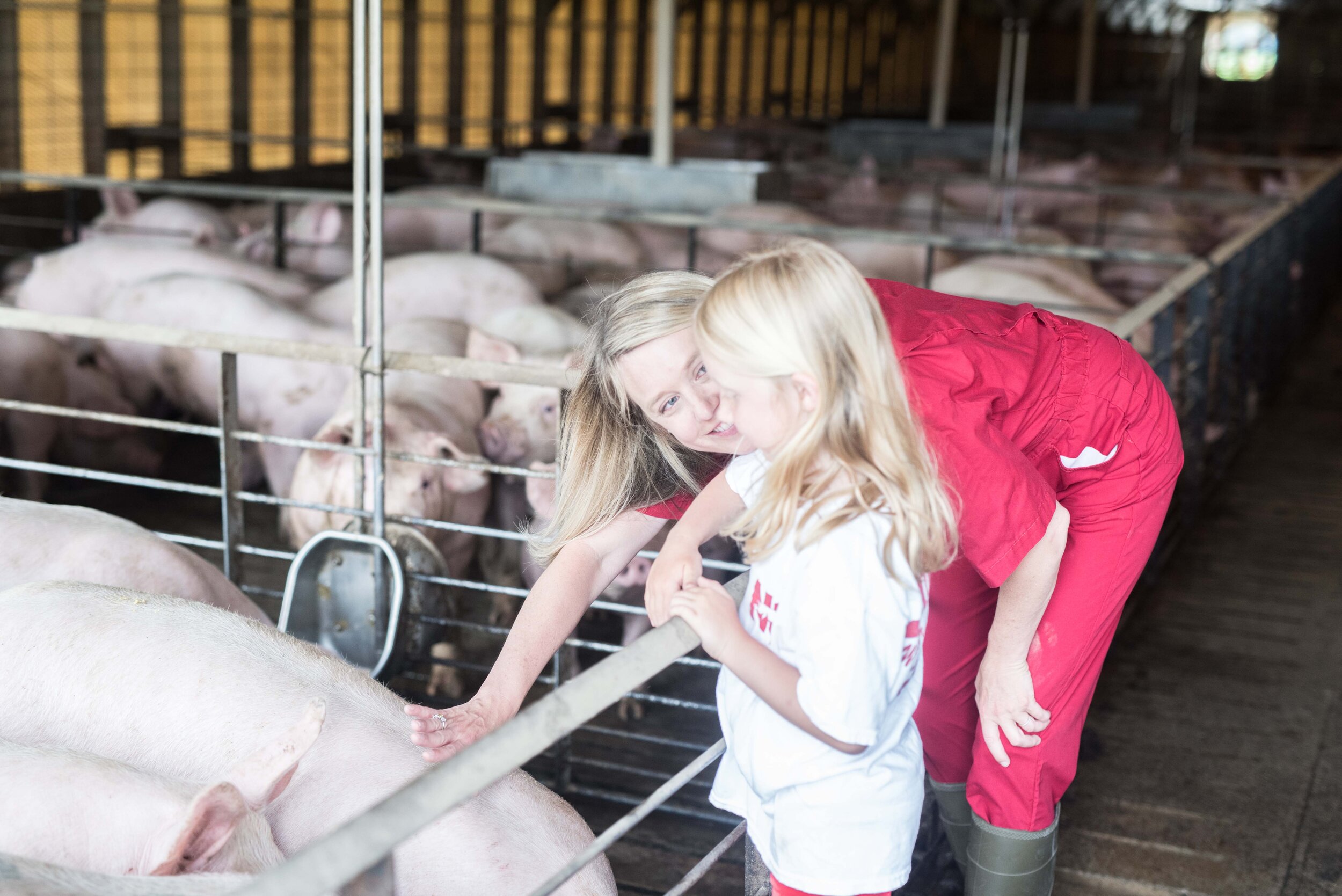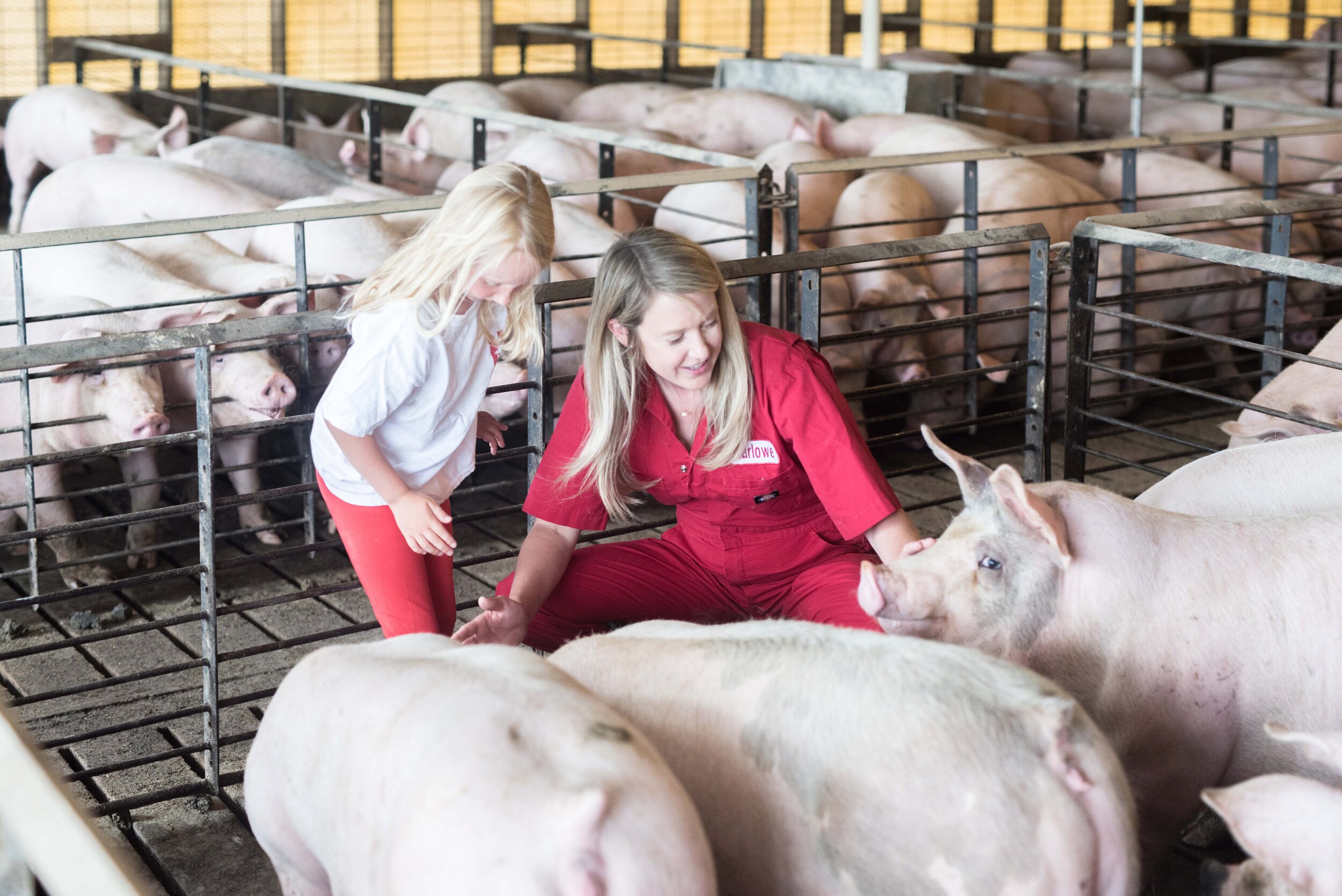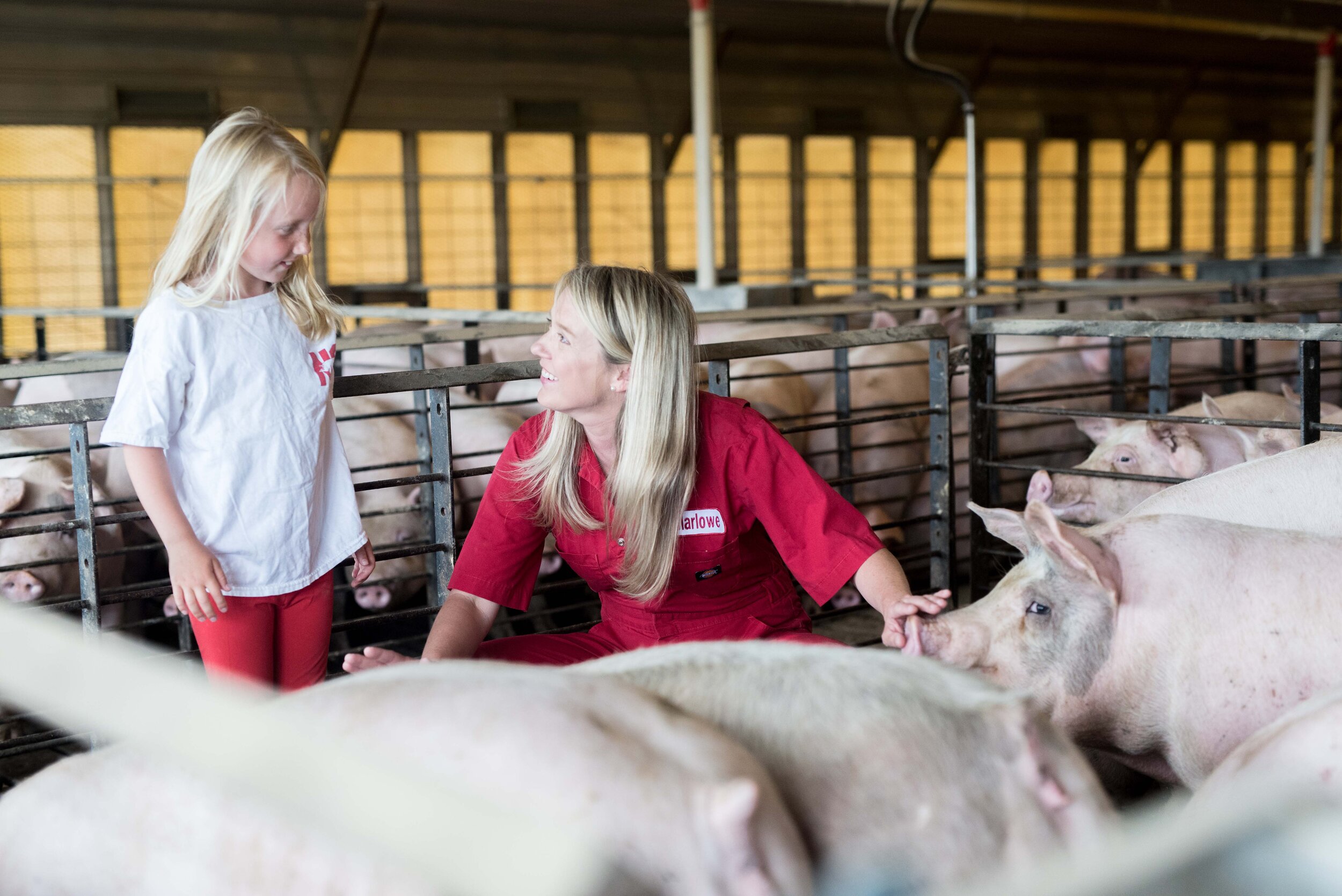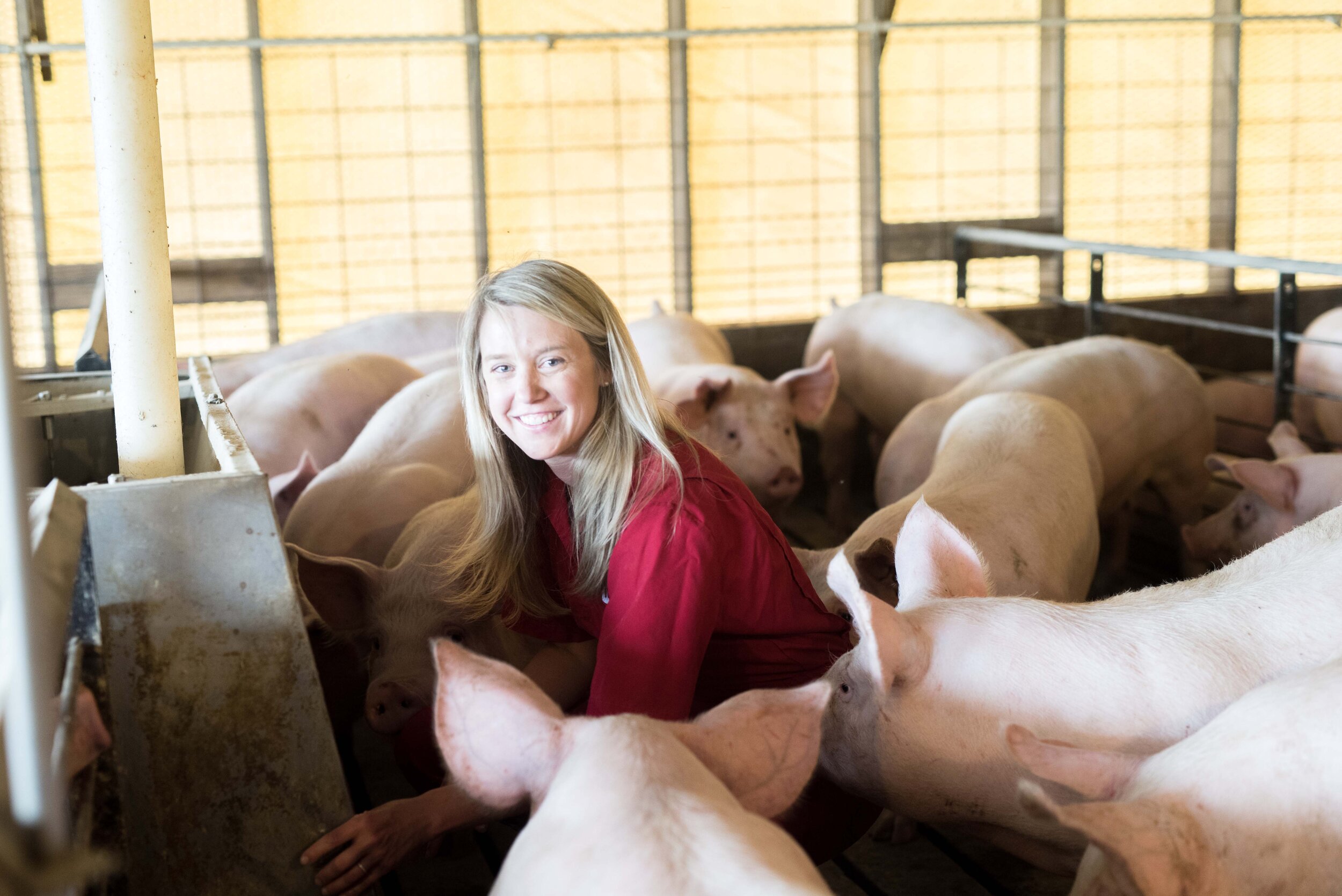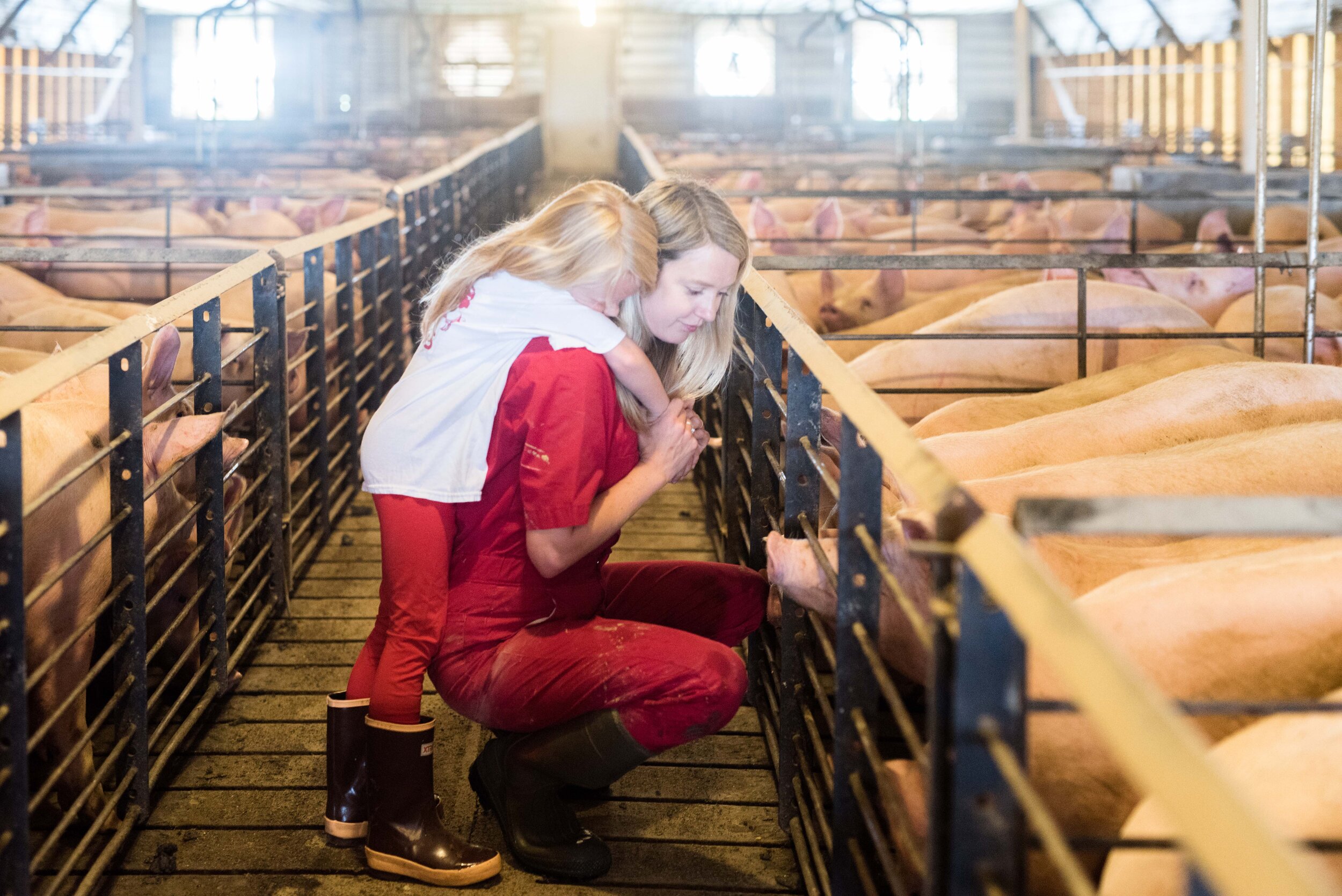The Legacy of a Pig Farmer
On one of her two pig farms, Marlowe Ivey Vaughn changes out of her “good clothes” into her “farm clothes”—her signature red coveralls and a pair of boots. She then turns her attention to a mini Marlowe—her 7 year old daughter, Kivett, who also gets a wardrobe change before heading into the pig barns.
Together, they walk hand in hand down the dirt path to one of the hog houses. They greet the pigs, giving high fives, or rather letting the pigs give them a snout to the hand. The visit isn’t just about socializing, the mother and daughter make sure all the pigs are doing well, have feed, and the water is fresh. Much to the pigs, and Kivett’s delight, Kivett gets to spray the pigs down with the water hose for a bit of fun too.
After visiting the pigs, they check on the fields of corn and wheat that are adjacent to the hog farm. Between the two, the corn is Kivett’s favorite. At the time, the wheat reaches Kivett’s shoulders while the corn hits her hip. Soon, though, the corn will tower over Kivett.
By the end of the day, it is Kivett getting sprayed off by the hose, not the pigs. She’s done what any good farm kid would—played in the dirt and mud.
Marlowe, not entirely thrilled with the thought of putting a muddy child in the car (there may or may not be pig poop mixed in there too), tries to hold back a smile. Because, although currently covered in mud, Kivett is more than her spunky, muddy daughter. Kivett is the future. She like Marlowe, is the daughter of a farmer, and has emphatically said that she too wants to be a pig farmer when she grows up.
In Kivett, Marlowe sees a legacy continue, a legacy that she continued from her dad. Marlowe once walked the barns with her dad, now she walks them with her daughter.
Marlowe didn’t always want to be a farmer. She thought about being a vet, and she tried some other things too, but agriculture and the farm pulled her back. Being a pig farmer is Marlowe’s passion, an identity, and a legacy.
Of course, pig farmer isn’t the only hat Marlowe wears—mom, wife, daughter, friend, executive director… Marlowe juggles a lot. In addition to raising two kids (Kivett has a little brother who just turned a year) and raising pigs, Marlowe raises awareness. Serving as Executive Director of Feed the Dialogue, a non-profit that seeks to start conversations surrounding NC agriculture, food, and farmers. Beyond her work with Feed the Dialogue, Marlowe also advocates for agriculture from her personal social media platforms, sharing daily life as a farmer. She battles misconceptions, shares the real reel, and has even weathered attacks from activists.
“I do this for them,” Marlowe said. “the other farmers who are too busy or don’t have the opportunities to advocate like I do, I do this for them, and I will never stop fighting for them.”
Marlowe is passionate about continuing not just her family’s legacy, but the legacy of agriculture as a whole.
Building a Different Legacy
Her legacy was that she loved with all she had…
The COVID-19 pandemic has brought considerable disruption and change to just about everyone this year, and pig farmers are no exception. The latest sign of that change came in early August when Maxwell Foods announced that it is shuttering its hog operations by mid 2021.
After 31 years, Maxwell Foods said it was a difficult, but necessary, decision. “The Maxwell family recognizes the enormity of this decision and it was with great difficulty that it was made,” the company said in a statement.
As a contract pig grower for Maxwell Foods, Marlowe is one of about 150 pig farms across the state impacted by the news. Working with an integrator is a partnership where each brings important aspects to the table. Overly simplified, the integrator (Maxwell Foods in this case) provides the pigs and resources, while the farmers provide the barns and care for the pigs.
It’s a situation that has farmers like Marlowe filled with uncertainty.
“I’m worried. I’m concerned about the future,” she said. Her connections with Maxwell Foods run long and deep — her dad, Bob Ivey, helped start and build the company three decades ago. She has been a grower for Maxwell Foods from the beginning.
“These are people who I’ve known my entire life — who are a part of who I am… Maxwell Foods is a part of who I was,” Marlowe said. “I want to save everybody. Not all of us are going to get saved.”
For Marlowe, and many others, the closing of Maxwell Foods represents the end of an era.
“I was proud of the legacy Dad built for me and the pig industry. It’s not that the legacy is gone, but it is sad to see the stress that it is under. It’s not stable anymore,” Marlowe said.
For now, farmers like Marlowe are waiting to see how everything shakes out. They are hopeful, but their hearts hurt. They are keenly aware of the challenges that may lie ahead.
Marlowe fears that some people will lose their farms. A loss of farm, is a loss of identity. For farmers, farming is a way of life. And the thought of losing one’s farm is more painful and more personal than losing a job or a piece of real estate. It is a loss of self, legacy, and heritage. It is a loss of a piece of one’s heart.
Agriculture remains the number one industry in North Carolina, with an economic impact of $92.7 billion. And the pork industry is a big part of that — contributing more than $10 billion a year to the state’s economy. Whenever a major agriculture business closes, it has an impact that is felt beyond the individual farms that are affected.
While many like the NC Pork Council remains optimistic that sustainable options will be found for contract farmers in the Maxwell Foods system, it is still a time of uncertainty and change for our farming community.
Marlowe’s daughter, Kivett, will grow up with a different legacy than her momma did. Although she won’t be a third-generation grower for Maxwell Foods, the hope is that Kivett will follow in Marlowe’s footsteps and carry on the family’s legacy of pig farming.
No matter what happens, though, Marlowe says that she will “build a different legacy,” and she will never stop supporting her fellow farmers who are like family.
One part of Marlowe’s legacy, however, remains firmly intact: that she loves with everything she has. She loves her family. She loves her farm. She loves her pigs. She loves her fellow farmers. And she continues to love despite it all.
How you can help: Farmers often say that the two biggest challenges in farming are the weather and misconceptions. There are many more challenges, of course, but these are the greatest. Misconceptions can easily be eliminated if everyone takes the time to understand their food and those who grow it. Marlowe encourages everyone to learn about the pork industry’s history and heritage, with a focus on what the future holds. There’s history in that porkchop that many never stop to consider.





